-
 Bitcoin
Bitcoin $120100
1.16% -
 Ethereum
Ethereum $4329
2.25% -
 XRP
XRP $3.192
-0.22% -
 Tether USDt
Tether USDt $1.000
-0.01% -
 BNB
BNB $805.2
0.47% -
 Solana
Solana $178.7
-1.85% -
 USDC
USDC $0.9998
0.00% -
 Dogecoin
Dogecoin $0.2305
-1.62% -
 TRON
TRON $0.3445
1.17% -
 Cardano
Cardano $0.7940
-1.28% -
 Hyperliquid
Hyperliquid $44.44
-1.20% -
 Chainlink
Chainlink $21.86
-2.42% -
 Stellar
Stellar $0.4423
-0.15% -
 Sui
Sui $3.728
-3.84% -
 Bitcoin Cash
Bitcoin Cash $584.8
2.19% -
 Hedera
Hedera $0.2524
-2.87% -
 Ethena USDe
Ethena USDe $1.001
-0.02% -
 Avalanche
Avalanche $23.66
-0.78% -
 Litecoin
Litecoin $124.5
0.39% -
 Toncoin
Toncoin $3.399
1.77% -
 UNUS SED LEO
UNUS SED LEO $9.002
-0.44% -
 Shiba Inu
Shiba Inu $0.00001327
-2.10% -
 Uniswap
Uniswap $11.42
2.58% -
 Polkadot
Polkadot $3.957
-2.50% -
 Cronos
Cronos $0.1696
4.50% -
 Dai
Dai $1.000
0.00% -
 Ethena
Ethena $0.8139
3.04% -
 Bitget Token
Bitget Token $4.442
-0.38% -
 Monero
Monero $271.2
2.93% -
 Pepe
Pepe $0.00001168
-2.91%
What are the advantages and challenges of using API for contract trading?
APIs for contract trading offer automation, real-time data access, customization, and granular control, but pose challenges in technical complexity, security risks, reliability concerns, and regulatory implications.
Feb 20, 2025 at 01:24 pm
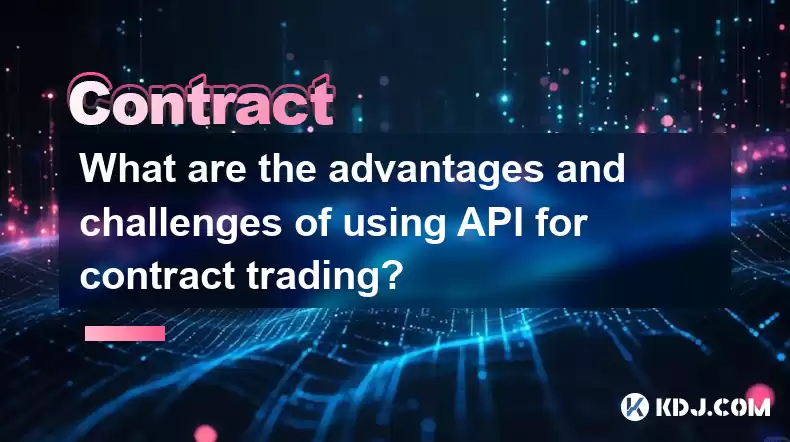
Key Points:
- Understand the Concept of API for Contract Trading
- Benefits of Using API for Contract Trading in Crypto
- Challenges of Utilizing API for Contract Trading
- How to Select the Right API for Your Needs
- Step-by-Step Guide to Using API for Contract Trading
- Best Practices for Effective API Contract Trading
- Common Errors to Avoid When Trading via API
What are the advantages and challenges of using API for contract trading?
1. Understand the Concept of API for Contract Trading
Application Programming Interface (API) in the context of contract trading serves as a bridge between your trading platform and external software or systems. It allows you to automate trading strategies, access real-time market data, and execute trades directly from your custom-developed applications.
Benefits of Using API for Contract Trading in Crypto
- Automation Capabilities: APIs enable you to automate repetitive tasks such as order placement, market monitoring, and risk management. This eliminates human error and allows for faster and more efficient trading.
- Real-Time Data Access: APIs provide direct access to real-time market data, including price updates, order book depth, and trading volume. This empowers traders with up-to-date information for informed decision-making.
- Customization Options: By using APIs, traders can customize their trading strategies and develop tailored solutions that suit their specific trading needs.
- Enhanced Control: APIs offer granular control over your trading parameters, allowing you to fine-tune your strategy and adjust it dynamically based on market conditions.
3. Challenges of Utilizing API for Contract Trading
- Technical Complexity: Setting up and maintaining APIs requires technical expertise. Developers need to have a strong understanding of programming, API protocols, and the specific requirements of the trading platform.
- Security Risks: APIs can introduce security vulnerabilities if not implemented properly. Malicious actors may exploit weaknesses in API design or implementation to gain unauthorized access to trading accounts.
- Reliability Concerns: APIs heavily rely on internet connectivity and server availability. Intermittent outages or latency issues can disrupt trading operations, leading to missed opportunities or financial losses.
- Monitoring and Maintenance: APIs require ongoing monitoring and maintenance to ensure optimal performance. This includes checking for updates, addressing bugs, and optimizing code efficiency.
- Regulatory Compliance: Using APIs for trading may impact regulatory compliance obligations. Traders need to be aware of applicable regulations and implement appropriate measures to ensure compliance.
4. How to Select the Right API for Your Needs
Selecting the right API for contract trading requires a careful evaluation of your needs and preferences.
- Functionality: Determine the specific functionality you require from an API, including the desired features, supported exchanges, and order types.
- Reliability: Choose an API with a proven track record of reliability and uptime. Check for user reviews, uptime statistics, and support availability.
- Security Features: Consider the security measures implemented by the API provider, such as encryption, authentication methods, and API key management practices.
- Documentation and Support: Choose an API with well-documented features, clear instructions, and responsive technical support to assist with integration and troubleshooting.
- Integration Capability: Ensure that the API can be seamlessly integrated with your existing applications or trading platform. Consider factors such as programming language compatibility, data formats, and API access limitations.
5. Step-by-Step Guide to Using API for Contract Trading
- Create an API Key: Most exchanges and trading platforms require users to create an API key to access their API services. This key allows you to identify your application and grant it specific permissions.
- Configure Your Application: Use the documentation provided by the API provider to configure your application. This typically involves setting up the API endpoint, authentication parameters, and specifying the desired trading operations.
- Connect to the Exchange: Establish a connection between your application and the trading platform using the API key. The connection should be secure and encrypted to protect sensitive data.
- Place Orders: Once connected, you can start placing orders through your application. Use the API commands provided by the exchange to specify the desired order type, symbol, and quantity.
- Monitor Your Trades: Continuously monitor the status of your trades and make adjustments as needed. The API provides real-time updates on the execution status, fills, and any changes in market conditions.
6. Best Practices for Effective API Contract Trading
- Use a Sandbox Environment: Before deploying your API in a live trading environment, test it thoroughly in a sandbox environment. This allows you to verify functionality and identify potential issues.
- Limit API Access: Only grant the necessary permissions to your API key to minimize security risks. Restrict access based on the specific operations or data that your application requires.
- Regularly Update Your API: Regularly check for updates and apply them to your API to ensure compatibility with platform changes, new features, and security enhancements.
- Monitor and Analyze: Continuously monitor the performance of your API and analyze trading results to identify areas for improvement. This helps optimize your strategies and make informed decisions.
- Follow Best Security Practices: Implement robust security measures to protect your API and trading accounts, including strong password management, multi-factor authentication, and regular security audits.
7. Common Errors to Avoid When Trading via API
- Lack of Testing: Insufficient testing can lead to errors in order placement, data retrieval, or execution strategies. Always test your API thoroughly before deploying it in a live environment.
- Incorrect API Key Management: Mismanagement of API keys, such as exposing them to unauthorized parties or storing them insecurely, can compromise your account security.
- Poor Error Handling: Not handling errors effectively can disrupt trading operations. Implement comprehensive error handling mechanisms to identify and address issues promptly.
- Exceeding Rate Limits: Some APIs impose rate limits to control the frequency of requests. Exceeding these limits can result in API errors or even account suspension.
- Ignoring Maintenance Updates: Failing to apply API updates can leave your application vulnerable to bugs, performance issues, or security breaches. Regularly update your API to ensure optimal performance and security.
FAQs
Q: What programming languages can I use with APIs for contract trading?
A: The programming languages supported for API contract trading vary depending on the specific exchange or trading platform. Common languages include Python, JavaScript, C++, Java, and Go.
Q: How do I ensure the security of my API key?
A: Protect your API key by following these best practices: Store it securely in an encrypted location, limit its access to authorized parties only, and revoke it immediately if compromised.
Q: Can I use multiple API keys for different purposes?
A: Yes, you can create multiple API keys for different applications or trading strategies. This allows you to control access and permissions more granularly.
Q: Are there any limitations to using APIs for contract trading?
A: Some exchanges may impose rate limits, restrict API access based on account type or trading volume, or charge additional fees for API usage.
Q: Is it necessary to have a deep understanding of programming to use APIs for contract trading?
A: Basic programming knowledge is required to integrate and use APIs effectively. However, there are pre-built trading libraries and tools available to simplify the process for less experienced developers.
Disclaimer:info@kdj.com
The information provided is not trading advice. kdj.com does not assume any responsibility for any investments made based on the information provided in this article. Cryptocurrencies are highly volatile and it is highly recommended that you invest with caution after thorough research!
If you believe that the content used on this website infringes your copyright, please contact us immediately (info@kdj.com) and we will delete it promptly.
- Bitcoin, Solana, MAGACOIN FINANCE: Navigating the 2025 Crypto Landscape
- 2025-08-12 00:30:13
- Cardano, ADA Holders, and Layer Brett: A Meme Coin with Real Utility?
- 2025-08-12 00:50:12
- Bitcoin, Michael Saylor, and Savvy Investors: A New Era of Digital Assets
- 2025-08-12 00:30:13
- Crypto Presales in 2025: Spotting the Next Big Thing with Analyst Insights
- 2025-08-12 00:50:12
- Cloud Mining in 2025: Bitcoin, Litecoin, and the Quest for Passive Income
- 2025-08-12 00:55:32
- Token Security, Agentic AI, Cybersecurity Guide: Navigating the New Frontier
- 2025-08-11 23:00:12
Related knowledge
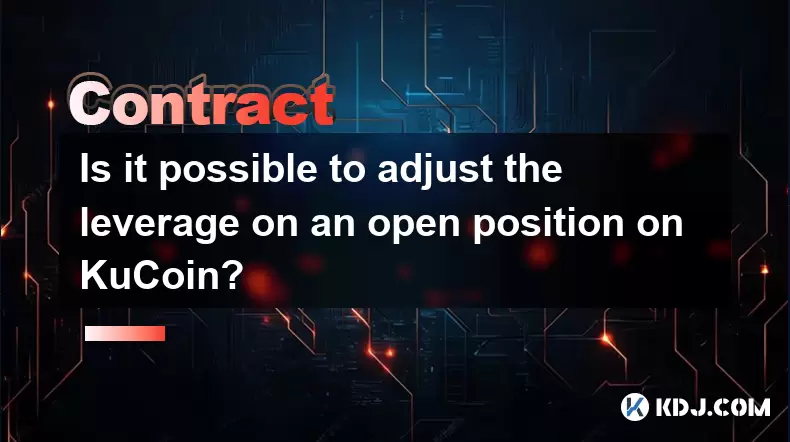
Is it possible to adjust the leverage on an open position on KuCoin?
Aug 09,2025 at 08:21pm
Understanding Leverage in KuCoin Futures TradingLeverage in KuCoin Futures allows traders to amplify their exposure to price movements by borrowing fu...

What cryptocurrencies are supported as collateral on KuCoin Futures?
Aug 11,2025 at 04:21am
Overview of KuCoin Futures and Collateral MechanismKuCoin Futures is a derivatives trading platform that allows users to trade perpetual and delivery ...
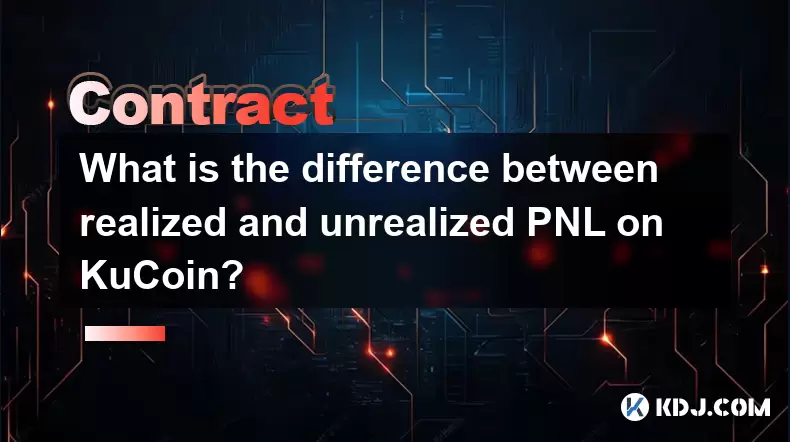
What is the difference between realized and unrealized PNL on KuCoin?
Aug 09,2025 at 01:49am
Understanding Realized and Unrealized PNL on KuCoinWhen trading on KuCoin, especially in futures and perpetual contracts, understanding the distinctio...

How does KuCoin Futures compare against Binance Futures in terms of features?
Aug 09,2025 at 03:22am
Trading Interface and User ExperienceThe trading interface is a critical component when comparing KuCoin Futures and Binance Futures, as it directly i...
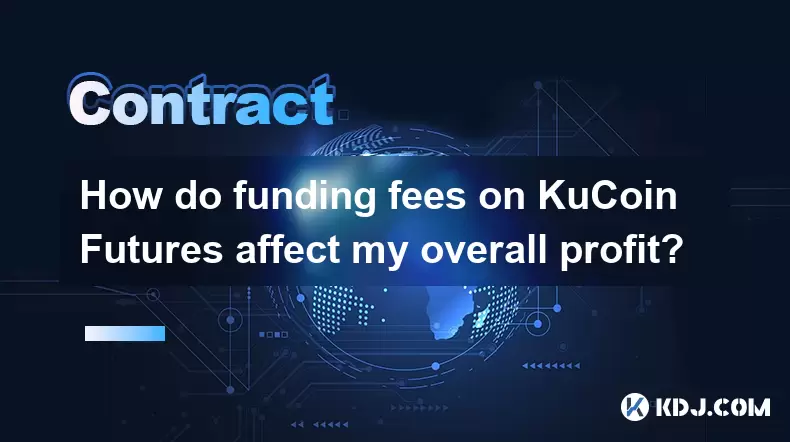
How do funding fees on KuCoin Futures affect my overall profit?
Aug 09,2025 at 08:22am
Understanding Funding Fees on KuCoin FuturesFunding fees on KuCoin Futures are periodic payments exchanged between long and short position holders to ...
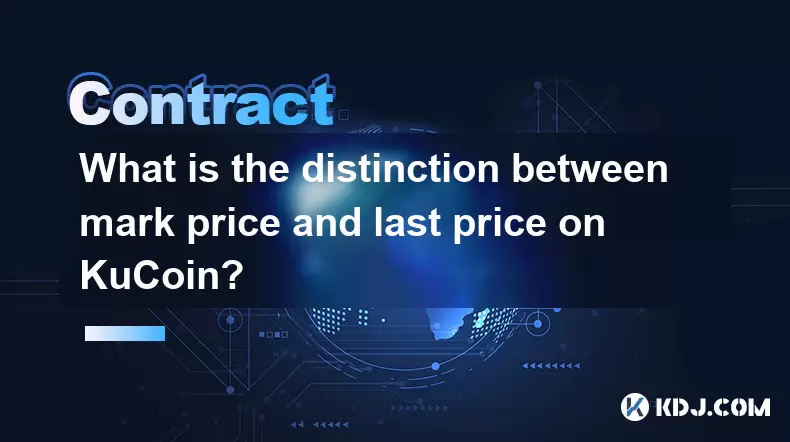
What is the distinction between mark price and last price on KuCoin?
Aug 08,2025 at 01:58pm
Understanding the Basics of Price in Cryptocurrency TradingIn cryptocurrency exchanges like KuCoin, two key price indicators frequently appear on trad...

Is it possible to adjust the leverage on an open position on KuCoin?
Aug 09,2025 at 08:21pm
Understanding Leverage in KuCoin Futures TradingLeverage in KuCoin Futures allows traders to amplify their exposure to price movements by borrowing fu...

What cryptocurrencies are supported as collateral on KuCoin Futures?
Aug 11,2025 at 04:21am
Overview of KuCoin Futures and Collateral MechanismKuCoin Futures is a derivatives trading platform that allows users to trade perpetual and delivery ...

What is the difference between realized and unrealized PNL on KuCoin?
Aug 09,2025 at 01:49am
Understanding Realized and Unrealized PNL on KuCoinWhen trading on KuCoin, especially in futures and perpetual contracts, understanding the distinctio...

How does KuCoin Futures compare against Binance Futures in terms of features?
Aug 09,2025 at 03:22am
Trading Interface and User ExperienceThe trading interface is a critical component when comparing KuCoin Futures and Binance Futures, as it directly i...

How do funding fees on KuCoin Futures affect my overall profit?
Aug 09,2025 at 08:22am
Understanding Funding Fees on KuCoin FuturesFunding fees on KuCoin Futures are periodic payments exchanged between long and short position holders to ...

What is the distinction between mark price and last price on KuCoin?
Aug 08,2025 at 01:58pm
Understanding the Basics of Price in Cryptocurrency TradingIn cryptocurrency exchanges like KuCoin, two key price indicators frequently appear on trad...
See all articles

























































































